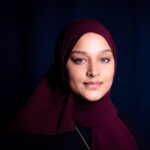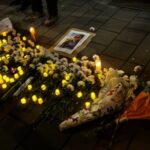How Canadian journalists who report Palestinian perspectives are dismissed, monitored, and censored
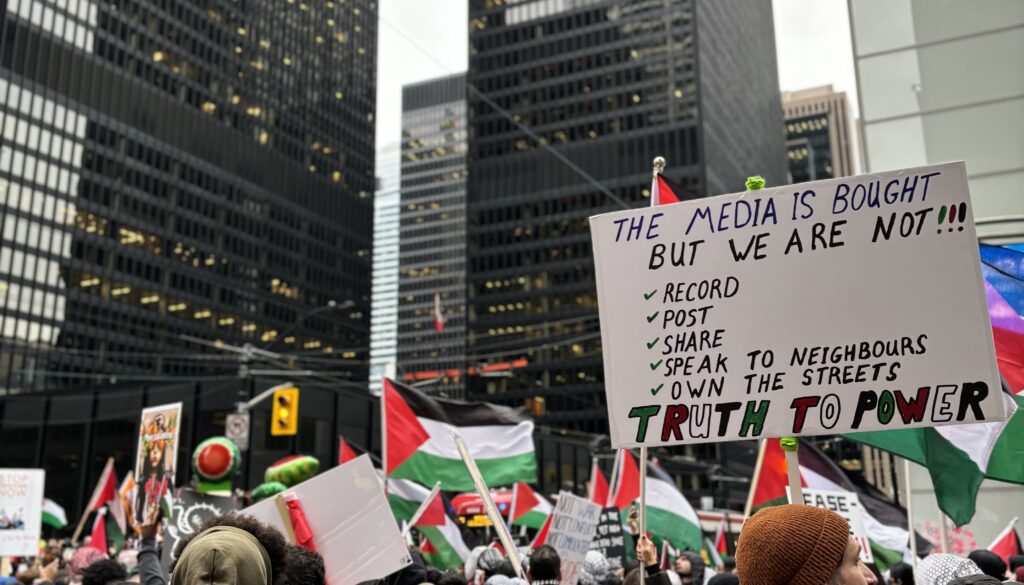
On October 19, 2023, the Israeli forces bombed the Greek Orthodox Saint Porphyrius Church, the world’s third oldest church, in Gaza City. The blast killed at least 16 and injured an unknown number of displaced Palestinians seeking shelter inside. Following the attack, a CBC News television producer suggested booking a Palestinian Canadian whose relative had been sheltering in the church and was killed in the strike. After hearing the pitch, an executive told the producer, who has asked to remain anonymous at the risk of losing job opportunities, to fact-check the relative’s death. In more than five years at the CBC, the producer had never been asked to fact-check a death, and was not asked to fact-check the deaths of Israeli family members. “What did they expect me to do, phone the Gaza health ministry and ask them to email a death certificate?” asks the producer, who quit in protest of the many instances of “double standards” she witnessed at CBC.
For years, the coverage of Israel–Palestine in Canadian newsrooms has inadequately represented the stark, beleaguered situation Palestinians have faced, and continues to downplay the state of Israel’s aggression and the killing of Palestinian civilians in occupied Palestinian territories.
As of March 27, Israeli forces’ retaliation for the Hamas attacks of October 7 has killed at least 34,000 people, over 13,000 of them children, and displaced almost 1.9 million Palestinians within the Gaza Strip. Meanwhile, Canadian newsrooms have reduced coverage of the Palestinian perspective, increased the vetting of Palestinian and Palestinian-ally guests, and revised their employees’ personal social media policies. In effect, they’ve been censoring their own journalists.
Patterns of coverage
This kind of censorship is not new. Just two years ago, Rahaf Farawi detailed the conditions of censorship when reporting on Palestine in her story “CBC’s Palestine Exception,” for the Review. She noted that the reporting on Palestine had a certain pattern: “[C]overage starts when mass casualties accumulate, and disappears when things dissipate, leaving little to no room for analysis.”
The trigger for Farawi’s story was a May 14, 2021, open letter, a call to action aimed at Canadian newsrooms, which stated: “[A]ll the tenets of journalism should apply to Canadian coverage of Occupied Palestinian Territories moving forward. Fair and balanced coverage should include historical and social context, reporters with knowledge of the region and, crucially, Palestinian voices.” Despite the call being signed by over 500 journalists or media industry professionals and 1,700 community members, little has changed.
In 2021, CBC received advance copies of a Human Rights Watch release, “A Threshold Crossed: Israeli Authorities and the Crimes of Apartheid and Persecution,” but decided not to report on it. In a column for Al Jazeera, Andrew Mitrovica reported that a CBC spokesperson had said that “there was no edict (nor would there ever be on any story) from anyone within CBC News not to cover this report,” and added that “our program teams make independent, editorial decisions.” Mitrovica’s column, “For CBC, a Dog Story Is More Important than Israel’s Apartheid,” noted that newsrooms in Canada gave more coverage to the death of former U.S. president Barack Obama’s dog than the “suffering and deaths of imprisoned Palestinians.”
For CBC journalists, the former producer says, “There is a chill around acknowledging that there are double standards or biases at play—well, because it can damage your career.” Mitrovica agrees, saying, “The Fourth Estate is supposed to monitor power. But that ends instantly when it comes to Israel.” He believes that silencing the Palestinian narrative can be traced back to long before the October 7 Hamas attacks on Israelis, and is “ingrained” in the publicly funded institution.
Take the example of reporting on increased settler violence in the West Bank. From October 7 to November 20, 2023, the Office of the High Commissioner of Human Rights reported that Israeli settler violence had doubled in the West Bank. The OHCHR recorded 254 settlers’ attacks, including “forcing [Palestinians] to leave their land, stealing their harvest and poisoning or vandalizing their olive trees,” thus depriving many Palestinians of a vital source of income. These averaged six incidents per day, double the three per day reported at the start of the year.
In a story pitch about violence in the West Bank, the former CBC producer suggested a speaker from the Palestinian Authority, to which an executive replied that the guest would be “biased.” As an alternative, the producer proposed guests from Amnesty International or the United Nations. The executive replied that they, too, would be “biased.” Looking back, the former producer says, “Never before, in covering any other story, have people from the UN or major human rights bodies been characterized as ‘biased.’ In the end, we didn’t do this story on the West Bank violence because I couldn’t come up with a guest who met this impossible criteria of being impartial.”
Prior to resigning, the producer outlined the coverage issues to colleagues and higher-ups, including the difference in treatment of Palestinian and Israeli guests on the program. The producer says that senior executives and hosts “weren’t pushing back when Israeli or pro-Israeli government figures would come on and say demonstrably false things on air.” Meanwhile, they were also “holding pro-Palestinian guests to a higher degree of scrutiny.”
According to the former producer’s observations, there was a “push” from seniors and executives to pretape Palestinian or Palestinian-ally interviewees when other guests were interviewed live. In one instance, the producer was pushed by a senior staff to pretape a Palestinian Canadian’s interview in which, later, a senior editor edited out the part where the guest spoke of Palestinians facing a genocide. The producer says the guest was upset and that these instances of censorship of the Palestinian narrative were becoming a pattern.
Additionally, the former producer noted that “interviews were being cancelled if the senior executives or the host thought that [Palestinian or Palestinian-ally interviewees] were going to say something which some people might find uncomfortable, for instance, using words like ‘genocide’ or ‘apartheid.’”
(Dis)Honest reporting
In late December, The Breach reported that an analysis of coverage in the National Post, The Globe and Mail, and the Toronto Star between October 7 and November 24 “shows a clear bias that serves to sanitize Palestinians’ deaths.” For example, the Globe described the Hamas attacks as a “horrific massacre,” but described the Israeli military in Gaza as a “deadly response.” Involving thousands of sentences analyzed, the study showed “a pattern of anti-Palestinian bias in Canada’s establishment media, sanitizing political violence against Palestinians and unequally stirring emotions about Israeli deaths.”
The Breach and the Review collaborated on a story titled “CBC Featured More Israelis Even as Palestinian Casualties Rose, Data Shows.” In the article, Emma Paling wrote, “CBC News’ The National featured 42 per cent more Israeli voices than Palestinian in its first month of coverage after the Oct. 7 Hamas attack.” (Disclosure: the author of this article was one of the researchers for both projects with The Breach.)
Groups such as HonestReporting Canada campaign for more pro-Israeli language in reporting. Davide Mastracci of The Maple recently detailed HRC’s inception 20 years ago within Canada’s media industry. He reported that in July 2023, HRC’s executive director Mike Fegelman said the group wanted “to create a digital army for Israel.” Over the past two decades, HRC has launched campaigns targeting most major news outlets in Canada, as well as journalists. On its website, it lists a number of “Media Corrections” arising from its pressure on news outlets. Mastracci writes, “The goal of these campaigns is to pressure the publication into making the desired change as well as to establish a relationship whereby the outlet will have HRC in mind when reporting on Israel.”
HRC’s tactics seem to be working. In September 2021, Fegelman reportedly claimed, “That added layer of editorial oversight we provide to the media is greatly appreciated by our newsmakers in a world of cutbacks where they don’t have that editorial oversight.”
A case in point is the occupied East Jerusalem neighbourhood of Sheikh Jarrah. In May 2021, following a months-long legal battle, Palestinian residents demonstrated to oppose their forced removal by Israeli forces, which would then hand over their homes to Israeli settlers. Across the occupied lands, Palestinians demonstrated in support of the families living in Sheikh Jarrah. Amnesty International said Palestinians were “met with excessive and deadly force by Israeli authorities with thousands injured, arrested and detained.”
In May 2021, following 11 days of Israeli attacks on Gaza, 260 Palestinians were killed, over a quarter of them children, and a further 2,200 were injured. In Canada and around the world, there were demonstrations against the Israeli attacks. Zahraa Al-Akhrass, a Palestinian video journalist working for Global News at the time, posted support for Palestinian rights and critiqued the state of Israel on her personal social media. HonestReporting Canada targeted Al-Akhrass with a campaign because of her social media content.
HRC claimed that Al-Akhrass was using social media “accusing Israel of targeting Palestinian civilians and killing children” as well as signing “an anti-Israel open letter accusing Israel of ‘ethnic cleansing.’” While she believed then, and now, that Global News did not stand up for her right to free speech, she reacted in fear to the accusations. “At that time, I was younger. I didn’t have much experience. I was scared. So I deleted my tweets.”
“I had to correct some journalists that Palestine and Pakistan are two separate countries.”
— Zahraa Al-Akhrass
This was not the only instance of Global objecting to her personal social media posts. Al-Akhrass was told to delete a picture of herself at a protest holding a sign that read, “Israel kills children and attacks journalists.” The company asked her to take down the image even though, to her, “the image had nothing unfair, unbalanced about it.” At that point, Al-Akhrass had had enough. “I decided,” she says, “the next time I’m asked to take down any tweets about Palestine, I’m going to push back.”
When Al-Akhrass began working at Global News in 2020, she says she was judged as being unbalanced and unfair. “I’m asked to be impartial about issues that matter to me,” she says. As a Palestinian, she felt that she should have been recognized as a person with firsthand experience of the region. Yet she says her colleagues and superiors “felt entitled to tell her how to think about Palestine.” For years, this has been the destiny of many racialized journalists in newsrooms, as Pacinthe Mattar explained in her 2022 article for The Walrus, “Objectivity Is a Privilege Afforded to White Journalists.”
Over the years, Al-Akhrass has had multiple conversations with fellow journalists about Palestine, one of which she remembers well. She says, “I had to correct some journalists that Palestine and Pakistan are two separate countries, and that Pakistan is not in the Middle East. I had to open Google Maps and show them where Pakistan is.” Referring to the incident, Al-Akhrass says, “This is a mixture of ignorance and disconnection from the region that’s far away from Canada.” It is also a choice not to learn.
Similarly, the former CBC producer mentions the “worrying lack of knowledge” in the newsroom. “One of my colleagues had to explain to a senior member of staff what the Nakba was.” Additionally, the former producer noted that despite more experienced journalists having been more likely to have covered past Israeli aggressions, the less experienced staff seemed to know more about the history.
The next time Al-Akhrass pushed back was in October 2023, shortly after her employment was also terminated. In a social media video explaining the incidents leading to her termination, Al-Akhrass said, “On the day of October 17, exactly, as we Palestinians were counting the deaths from the [Baptist Hospital] massacre that took the lives of over 500 people in Gaza, I was on a phone call with a senior leader at Global News to be told I’m fired for everything I’ve been posting.”
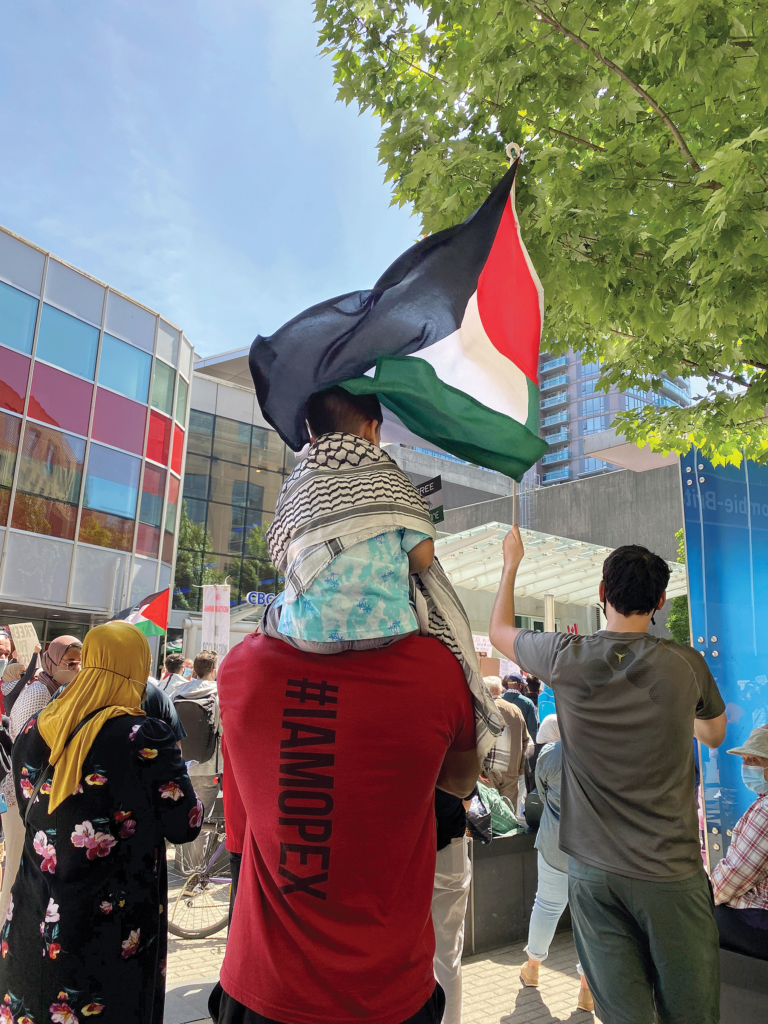
Al-Akhrass says her direct manager reminded her of the company’s social media policy through her personal email address, saying that journalists are asked to remain fair and balanced when speaking about Palestine, despite their personal views. Additionally, he informed Al-Akhrass that a complaint had been filed against her. He recommended she stop posting publicly about Palestine and to remove whatever she had already posted. “I was not provided with one single example,” she says. “I repeatedly asked the company to provide me with links.” She responded to her manager’s email by explaining her position as a Palestinian, which she says she had done many times at Global. Al-Akhrass says she told her manager that, ultimately, she wanted to come to an agreement in which the company would vouch for her right to free speech and respect the suffering of Palestinians.
Al-Akhrass says the senior member did not reply for two days, so she sent a follow-up. The senior member acknowledged receiving the email and said his response would come in the near future. But that was the end of the email conversation. Then a workplace investigator from the ethics and conduct office of Corus, Global News’s parent company, contacted her. She says the investigator told her another complaint had been lodged against her and the investigator wanted to set up a meeting.
During this period, there wasn’t a word of sympathy or recognition from anyone at the company about the difficult time she was going through as a Palestinian. There were, however, investigation reminders, social media policy reminders, demands to stop posting, and demands to take down content with the hashtags #FreePalestine, #GazaGenocide, and #GazaUnderAttack.
“At that point,” Al-Akhrass says, “I felt so disrespected, that this company keeps trying to get me into meetings and demanding me to stop posting. No one bothered to ask me how am I doing?” Al-Akhrass says in her response to the workplace investigator she included screenshots of an Instagram post that had an image of a dead Gazan baby. “I told her that this image has been my reality and my people’s reality for decades. So I would actually like some understanding, some respect.”
The workplace investigator took issue with the image and filed a complaint with upper management. As a result, it was written in Al-Akhrass’s notice of termination that she violated the company’s respect-in-the-workplace policy by sending a disturbing image to an employee. Al-Akhrass says, “Instead of sympathizing with over two million Palestinians under Israeli bombardment in Gaza, she chose to focus on her own feelings. She thought that her own peace of mind was more important.”
Corus offered to pay Al-Akhrass in return for signing a nondisclosure agreement regarding her termination. She refused the money. Being the only Palestinian in the Global newsroom, she says, “I thought that my voice was very important to them, my perspective was important to them, and being on the table was important to them, because I certainly was paraded in the newsroom.”
Like, follow, share
On January 26, the International Court of Justice ordered the state of Israel to “punish and prevent” incitement to genocide, as well as “take all measures within its power to prevent” actions that fall under the Genocide Convention. Outside the court in the Hague, journalists from news organizations all over the world crowded around South African officials who brought the allegations against the state of Israel to the ICJ. After the provisional measures were delivered, Naledi Pandor, South Africa’s minister of international relations, spoke to the urgency and need to protect civilians in Palestine. A reporter asked her, “What does it say about Israel, as a country, a government, and a military?” Pandor replied, “I think that’s for you and the public to decide. What we said is, here’s an international instrument. Let us bring it into operation, and let’s stop being observers of significant harm. Let’s act. And South Africa has acted.”
One of the last questions she was asked was, “But will this sever ties with Israel or are you preserving ties with Israel?” To which Pandor, who tried to maintain a smile that faded while she spoke, responded, “I don’t think it’s a matter of South Africa and Israel here. All of your questions are about Israel, but the real issue is the people of Palestine, who are being killed every day. The people of Palestine who are sleeping in the cold. The people of Palestine who are denied food, water, and energy. That is the critical issue that all of us should focus upon.”
Alternative forms of media and social media offer Palestinians and Palestinian allies a place to knowledge-share and illustrate the lived experiences Palestinians face under Israel’s occupation. In recent months, the harrowing experiences Palestinians face have been documented on social media, including being detained, injured, or killed by Israeli forces, have themselves been censored on social media.
In late November 2023, CBC News sent an email to remind staff of its policy on social media, stating, “[I]n its simplest form, it means that on matters of public interest, controversy, politics or stories we are actively covering as a news organization, we do not post or share to ANY social media platform information that CBC has not—or would not—put on air or online.”
Mattar posted about CBC’s revised social media policy on X, saying it was “[s]ignificant given the outsize role that Gaza-based social media reporting has played in showing what rarely makes it in legacy media.”
This policy change is striking considering the instrumental role of social media in combating mainstream media narratives on Palestine. Social media has raised awareness to harness support for Palestinians and, through the work of targeted journalists on the ground in Gaza and across occupied Palestine, it has served to document the conditions in Gaza. The former producer says the policy is “absurd” and “because the CBC is not in Gaza, it means that you can never share experiences of people on the ground.”
A December 21, 2023, Human Rights Watch report, Meta’s Broken Promises: Systemic Censorship of Palestine Content on Instagram and Facebook, said, “Instagram and Facebook have in several instances since October 7 suspended or permanently disabled the accounts of prominent Palestinian content creators, independent Palestinian journalists, and Palestinian activists.” For example, in November, Palestinian journalist Ahmed Shihab-Eldin reported that since October 7, he had lost access to his Instagram five times. Likewise, Motaz Azaiza, a Palestinian photojournalist with over 18 million followers, reporting from Gaza, was censored temporarily before his access was restored.
Israel’s indiscriminate bombardment of Gaza has marked the “deadliest period” for journalists since the Committee to Protect Journalists began gathering data in 1992. The CPJ reports that the number of journalists killed includes at least 90 Palestinian, two Israeli, and three Lebanese media workers. However, media offices in Gaza, including the Palestinian Journalists Syndicate, count 125 journalists killed by Israeli aircraft.
When pitching a story about the disproportionate number of journalists killed in Gaza, the former CBC producer says they were told by a senior producer the topic was “navel-gazing.” Toronto Metropolitan University School of Journalism professors Sonya Fatah and Asmaa Malik wrote about the attacks on press freedoms for The Walrus, stating, “The lack of a unified response from Western news organizations to this blatant attack on press freedom is shocking and evidences concerns about the diminished value of the life of a non-Western journalist.”
Omar Zahzah, assistant professor of Arab, Muslim, Ethnicities, and Diaspora Studies at San Francisco State University (SFSU), who has written about censorship of Palestinian narratives, says social media is theoretically supposed to counter the hegemony of mainstream media narratives. “You have an Israeli narrative hegemony that has been operative for decades in the establishment media or corporate media,” he says. “Social media was poised as a tool that could challenge that and, in many cases, there’s almost a fleeting quality to it.” In the case of Palestinian narratives being censored, Zahzah says it becomes the responsibility of journalists to push back against power systems of imperialism and dispossession.
Our responsibility
“On October 20, 2023—when Israel had already killed over 4,000 Palestinians in Gaza—one sixth of the law students at TMU’s Lincoln Alexander School of Law sent the Dean a petition expressing ‘solidarity with Palestine,’ while also describing Hamas’ attacks on Israel as ‘war crimes,’” TMU law professor Joshua Sealy-Harrington wrote for Ricochet.
In the article, “How Anti-Palestinian Racism Led to a ‘Crisis’ at TMU’s Law School,” Sealy-Harrington discusses how the Star’s investigation into the petition, along with those of other conservative media outlets, misrepresented the students’ views, and notes that the Star was “unwilling to publish either an op-ed or letter in response.”
Sealy-Harrington outlined three main issues with the Star investigation. First, the Star failed to report the extent of the backlash that the students faced, including “death threats, lost employment, potential expulsion, doxing, and harassment—is essentially predicated on the claim that their petition celebrates Hamas’ October 7 attack. This is false.” The students, in their petition, called the Hamas attacks a “war crime,” and they did not state that the attack was “justified,” as the Star reported. Second, Sealy-Harrington writes how the Star’s labelling of a “crisis” at TMU’s law school “assumes there was peace concerning Palestine,” when, in fact, the students were “responding to already established anti-Palestinian bias at the law school.” And third, Sealy-Harrington writes how the Star’s own reporting “reflects anti-Palestinian media bias.” He refers to the Star’s sanitized language, for instance, “‘Hamas’s October 7 deadly incursion into Israel’ (active voice) versus ‘mass displacement and death in Gaza’ (passive voice).” On the last point, Sealy-Harrington echoes The Breach’s finding that the Star uses sanitized language when it comes to Palestinian deaths.
The Star disagrees with Sealy-Harrington’s position that its reporting was biased, saying that the students were represented fairly in its piece.
To SFSU’s Zahzah, this is not what journalists should be doing. Instead, he says, “The responsibility of so many institutions and individuals working in institutions—that pride themselves on doing quality journalism—should be amplifying Palestinian voices.”
On October 16, 2023, freelance journalist Shenaz Kermalli’s piece “The Story of Israel and Hamas Did Not Start Last Weekend” was published in the Star. She wrote, “[S]ome western media are casting current events—as if the chain of violence came completely out of a vacuum.” That same day, in Gaza City, Mohammed Sami, a Palestinian artist, decided to organize activities for young children to alleviate their stress and fear at the Al-Ahli Hospital. Sami’s last footage, still up on his Instagram, shows smiling children on a playground, taking part in cleaning and playing all together.
The next evening, October 17, the hospital’s parking lot was targeted—by Israeli forces, according to Hamas; by Hamas, according to Israeli forces. The strike killed 471 and injured 342 Palestinians, mainly children. Palestinian journalists, who arrived shortly after, reported and published footage of bodies massacred and burned, practically unrecognizable, on the ground. In the following days, the international community and leaders began to condemn the hospital massacre, many without attributing blame. Additionally, demonstrations occurred in a number of cities, including in the occupied West Bank, Lebanon, Jordan, Libya, and Yemen.
“I was also told I could not use the word ‘Palestine’ because it didn’t exist.”
— Ginella Massa
On October 18, CBC News welcomed Israeli forces spokesperson Lieutenant-Colonel Jonathan Conricus to comment. Conricus addressed those who believe Israeli forces committed the hospital massacre, saying, “I would believe they are siding with the side of darkness.” At no point during the interview did the CBC News anchor challenge the Israeli forces’ spokesperson. “We’re missing humanity in our coverage,” Mattar says. “Instead, we prop up voices that are much more extreme.” She adds, “I was moved to tears, watching interviews with families of the Israeli hostages, some of whom had been killed by Hamas, many of them saying do not use our family’s deaths as a reason to kill more innocent people. That kind of humanity is life-changing.” And yet, Mattar says, she doesn’t see it being reported widely.
There are a number of language choices that instead impose harm on Palestinians. “The media are overwhelmingly favouring and using the narrative of the Israeli military and the Israeli government, as opposed to doing their own objective accounting of the facts that takes into account how this is being experienced by Palestinians,” says Mattar.
Kermalli says that using a reporting phrase such as “Hamas-run” when referring to Gaza’s Ministry of Health is problematic because it is “aimed at undermining any information that comes out of the ministry, which is run by bureaucrats and medical professionals.” She adds, “If we’ve never found a reason to find that there’s been a discrepancy in the data [from the Ministry of Health] that’s coming out there, why then do we continue to use this language?”
The impact of the language that journalists use—suggesting Hamas’s presence in hospitals, for instance—becomes material for hospitals to be viable targets for Israeli forces in Gaza. On February 14, Al Jazeera reported that Israeli forces’ bombardment of Gaza had left only 11 out of 36 hospitals partially functioning. At least 374 health-care workers had been killed in targeted assassinations and 120 ambulances destroyed.
Kermalli, who is also a journalism instructor at TMU, thinks there will be little reflection on how newsrooms in Canada are covering the topic because of limited resources and a fast-paced environment. She has not lost all hope, though. When she speaks to students in her classes, students who will be the next generation of journalists, she recognizes the thirst for change. “There is great power in knowing that there are journalists within who know that there is a different way of doing things,” she says, “even if they are not yet at the point where they can enact that change.”
Canadian broadcast journalist Ginella Massa believes the coverage of Palestine has been skewed for a long time. In her 13 years across multiple newsrooms, she describes how she’s been told not to refer to Palestine as a country. She recalls an incident at CityNews in Toronto, saying, “I remember covering a story on Israeli elections and was also told I could not use the word ‘Palestine’ because it didn’t exist.”
Although Massa doesn’t currently work for a news outlet and so has the freedom to express her personal views, she chooses her words carefully, knowing they’ll be published. She recognizes that her words can be used against her and probably will be by groups whose mission is to put pressure on those who criticize the state of Israel.
Massa takes issue with referring to the crisis as the “Israel–Hamas war” because it presents the conflict as an equal fight, when in fact, “one has a mightier force than the other,” impacting civilians in Gaza, where the “death toll has far outweighed the death toll in Israel on October 7.” She says the job of journalists should be to offer context and history, but in telling this story, she believes journalists are not doing their jobs. She would like reporters to recognize that human rights are not political. “It shouldn’t be controversial for us to say what we are witnessing is an atrocity.”
There are a number of topics where journalists identify an aggressor and a victim, where they speak up for protecting human rights. However, Massa says when it comes to Palestine, “There really isn’t any appetite for talking about the daily injustices and suffering, on occupation, and what human rights organizations have labelled as an apartheid. That conversation only happens when it rises to the level of violence and, typically, when the victims of the violence are on the Israeli side.”
In 2020, when the Black Lives Matter movement gained attention, Massa recalls it as a time when journalists could face repercussions for using the hashtag #BlackLivesMatter on social media. But then, she says, “Newsrooms had this moment of reckoning, of reflecting, of listening, and learning of acknowledging their failings in covering race and racism and in applying these rules that impacted racialized journalists in a different way.” The culture of the newsroom was being tested, but eventually, people were allowed to bring experiences of anti-Black racism into the newsroom. This change helped to recognize intersectional journalists as experts on matters that affected them.
Massa hopes for a quick end to the violence and a permanent ceasefire, but wonders if and how the coverage will change from there. “Will we hear from Palestinian voices about the realities of their day-to-day lives, which are going to look very different from what they were before?” she asks. “Or will we say, well, the violence is done and we’re not going to talk about this anymore.” Massa says that will be a telling moment for Canadian media.
May 21, 2024: This story has been updated to reflect the Toronto Star’s position on its article about TMU’s law school.
With files from Domenic Demasi.
About the author
Saman is in her final year of the Master of Journalism program. She is a research assistant at TMU’s Journalism Research Centre, founder and producer of a Met Radio show, and Digital Editor & Social Media coordinator for The Otter. She has a background in communications and an interest in promoting media literacy.
